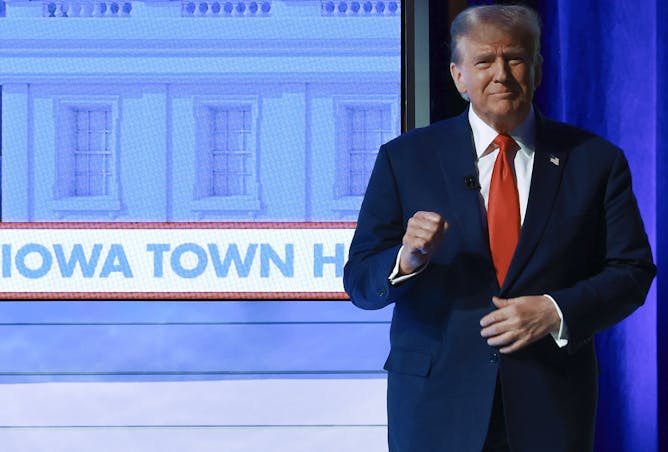|
Top headlines
Lead story
The Iowa caucuses are best known as a contest where long-shot political candidates earn a brief and shining victory − and then just as quickly fade into distant memory.
Think Pete Buttigieg in 2020, Ben Carson in 2016, Rick Santorum in 2012, Mike Huckabee in 2008 and Howard Dean in 2004.
But 2024 caucus voters didn’t do anything surprising. Former president Donald Trump, who had dominated in the polls, earned 51% of the vote. Trailing behind were GOP rivals Ron DeSantis at 21% and Nikki Haley at 19%.
Regardless how the caucuses turned out, it is worth casting a skeptical eye over a contest that occurs in an overwhelmingly white state plagued with low voter turnout. With temperatures below zero, just about 115,000 people turned out to caucus last night.
“Every four years,” political scientist Stephen J. Farnsworth wrote, “the Iowa caucuses find new ways to become a problematic part of the presidential nomination process.”
[ Sign up for our weekly Global Economy & Business newsletter, with interesting perspectives from experts around the world. ]
|

Republican presidential candidate Donald Trump appears at a Fox News town hall in Des Moines, Iowa on Jan. 10, 2024.
Joe Raedle/Getty Images
Stephen J. Farnsworth, University of Mary Washington
The Iowa caucuses have long been an oddity in modern-day politics but remain a place where GOP candidates can test their presidential aspirations.
|
Environment + Energy
|
-
Abieyuwa Aghayere, Drexel University
Too often, signs of trouble are ignored until a problem becomes a crisis. Here are some clear warning signs residents should watch for. If you see something, say something – it could save lives.
-
Julia Wester, University of Miami
A survey of Miami-Dade residents found bipartisan support for protecting Biscayne Bay − though most locals were not aware of the extent of its decline in recent years.
|
|
Economy + Business
|
-
Jason Owen-Smith, University of Michigan
The latest government showdown over the budget risks not only a shutdown but jobs, regional economies and America’s competitiveness in AI and other advanced fields.
|
|
Education
|
-
Gerald K. LeTendre, Penn State
Social robots can be useful tools to help students learn about programming, but here’s why they won’t be replacing classroom teachers anytime soon.
|
|
Politics + Society
|
-
Laura A. Henry, Bowdoin College
More than six years after Pavel Sulyandziga, an Indigenous activist from Russia, left the country to seek political asylum in the US, he continues to face harassment by the Russian government.
|
|
Science + Technology
|
-
Christopher Damman, University of Washington
Weight loss and diabetes drugs target regulatory pathways involved in metabolism that the microbes in your gut and certain molecules from food already play a key role in regulating.
-
Partha Banerjee, University of Dayton
Using fingerprints to catch criminals isn’t 100% accurate, but analyzing fingerprints in 3D, rather than 2D, could improve the process.
|
|
International
|
-
Alemayehu Weldemariam, Indiana University
Somalia has demanded that a memorandum of understanding – which would see Ethiopia gain access to the Red Sea via a Somaliland port – be ripped up.
-
Peter Cunliffe-Jones, University of Westminster; Lucas Graves, University of Wisconsin-Madison
Artificial intelligence is likely to make the ‘fake news’ problem worse. But it can also be used to help us counter misinformation.
|
|